Posted on October 19, 2005 by The Orwell Prize -

A journalistic memoir from one of the most recognisable TV news correspondents in the UK. How do you decide what is a ‘story’ and what isn’t? What does a newspaper editor actually do all day? How do hacks get their scoops? How do the TV stations choose their news bulletins? How do you persuade people to say those awful, embarassing things? Who earns what? How do journalists manage to look in the mirror after the way they sometimes behave? The purpose of this insider’s account is to provide an answer to all these questions and more. Andrew Marr’s brilliant, and brilliantly funny, book is a guide to those of us who read newspapers, or who listen to and watch news bulletins but want to know more. Andrew Marr tells the story of modern journalism through his own experience. This is an extremely readable and utterly unique modern social history of British journalism, with all its odd glamour, smashed hopes and future possibility.
Posted on October 19, 2005 by The Orwell Prize -

Juliet Gardiner’s critically acclaimed book – the first in a generation to tell the people’s story of the Second World War – offers a compelling and comprehensive account of the pervasiveness of war on the Home Front. The book has been commended for its inclusion of many under-described aspects of the Home Front, and alongside familiar stories of food shortages, evacuation and the arrival of the GIs, are stories of Conscientious Objectors, persecuted Italians living in Britain and Lumber Jills working in the New Forest. Drawing on a multitude of sources, many previously unpublished, she tells the story of those six gruelling years in voices from the Orkney Islands to Cornwall, from the Houses of Parliament to the Nottinghamshire mines.
Posted on October 19, 2005 by The Orwell Prize -
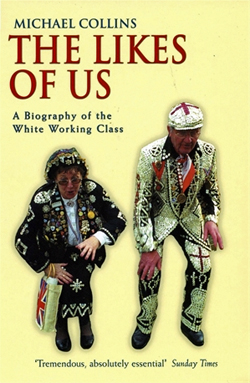
Once they were portrayed as the salt of the earth. Nowadays, they take to the streets when paedophiles and asylum seekers are in their midst; they expose their lives in TV documentaries; they love Gucci and hate the Euro – the broadsheets cast them as xenophobes and exhibitionists and mock their tastes and attitudes. Who are the white working class and what have they done to deserve this portrayal? The Likes of Us is a fascinating and wholly original examination of London’s white working class.
Posted on October 19, 2005 by The Orwell Prize -
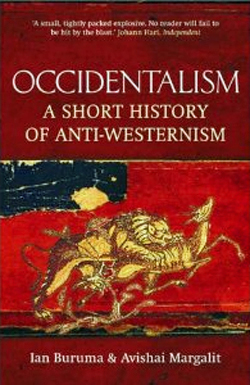
A profound investigation of the history of anti-Westersn stereotypes that traces them back to the West itself. Twenty -five years ago, Edward Said’s Orientalism described the denigrating mirage of ‘the East’ in the Western colonial mind. But as Ian Buruma and Avishai Margalit show in this book, ‘the West’ is the more dangerous mirage of our time, and the idea of us in the minds of our self proclaimed enemies is still largely unexamined and misunderstood. Occidentalism is their groundbreaking investigation of the demonizing fantasies and stereotypes about the Western world that fuel such hatred in others. ‘Radical Islam’ is generally perceived as a purely Islamic phenomenon, but Buruma nad Argalit show that this radicalism owes primary debt to the West. Movement like al-Qaeda are stalked by the same Western bogeymen that have haunted the thoughts of revolutionary groups going back to the early nineteenth century. The same elements of the anti-Western worldview appear again and again: the rootless cosmopolitan living in the Western city; the sterile Western mind, all reason and no soul; the machine society, controlled from the centre by a cabal of insiders – often Jews – pulling the hidden levers of power. The anti-Western virus has found a ready host in the Islamic world for a number of legitimate reasons, but in no way is it exclusively Islamic matter. A world of extraordinary range and erudition, Occidentalism will permanently enlarge our understanding of the world in which we live.
Posted on October 19, 2004 by The Orwell Prize -

Still in her teenage years, Nazneen finds herself in an arranged marriage with a disappointed man who is twenty years older. Away from the mud and heat of her Bangladeshi village, home is now a cramped flat in a high-rise block in London’s East End. Nazneen knows not a word of English, and is forced to depend on her husband. But unlike him she is practical and wise, and befriends a fellow Asian girl Razia, who helps her understand the strange ways of her adopted new British home. Nazneen keeps in touch with her sister Hasina back in the village. But the rebellious Hasina has kicked against cultural tradition and run off in a ‘love marriage’ with the man of her dreams. When he suddenly turns violent, she is forced into the degrading job of garment girl in a cloth factory. Confined in her flat by tradition and family duty, Nazneen also sews furiously for a living, shut away with her buttons and linings – until the radical Karim steps unexpectedly into her life. On a background of racial conflict and tension, they embark on a love affair that forces Nazneen finally to take control of her fate. Strikingly imagined, gracious and funny, this novel is at once epic and intimate. Exploring the role of Fate in our lives – those who accept it; those who defy it – it traces the extraordinary transformation of an Asian girl, from cautious and shy to bold and dignified woman.
Posted on October 19, 2004 by The Orwell Prize -
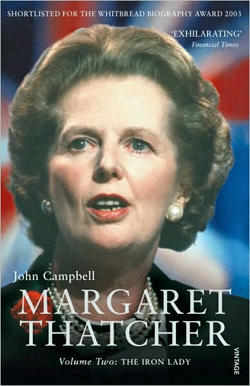
The first volume of John Campbell’s biography of Margaret Thatcher was described by Frank Johnson in the Daily Telegraph as ‘much the best book yet written about Lady Thatcher’. That volume, The Grocer’s Daughter, described Mrs Thatcher’s childhood and early career up until the 1979 General Election which carried her into Downing Street. This second volume covers the whole eleven and a half years of her momentous premiership. Thirteen years after her removal from power, this is the first comprehensive and fully researched study of the Thatcher Government from its hesitant beginning to its dramatic end. Campbell draws on the mass of memoirs and diaries of Mrs Thatcher’s colleagues, aides, advisers and rivals, as well as on original material from the Ronald Reagan archive, shedding fascinating new light on the Reagan-Thatcher ‘special relationship’, and on dozens of interviews. The Iron Lady will confirm John Campbell’s Margaret Thatcher as one of the greatest political biographies of recent times.
Posted on October 19, 2004 by The Orwell Prize -
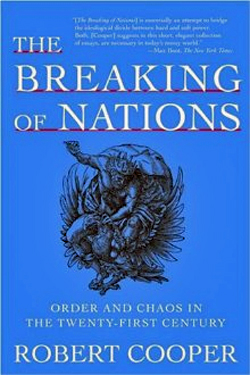
When communism collapsed in 1989 there was a fundamental change in the European state system. This landmark book presents a radical interpretation of the new international order. Many of what Cooper calls ‘post-modern’ states, including the EU and Japan, operate on the basis of openness, law and mutual security. The United States, Cooper shows, has yet to decide whether to embrace the ‘post-modern’ world of independence, or to pursue unilateralism and power politics. The key question is how these states should deal with a world in which terrorists ignore borders and the familiar certainties of the Cold War alliances no longer exist. He argues theat Europeans have to be prepared to use the rougher methods of an earlier era – force, pre-emptive attack, deception – if they are serious about safeguarding the stability they have achieved.
The Breaking of Nations is required reading for those seeking to understand the uncertain times in which we live.
Posted on October 19, 2004 by The Orwell Prize -

The story of the Warsaw Rising from the the leading British authority on the history of Poland. Rising ’44 is a brilliant narrative account of one of the most dramatic episodes in 20th century history, drawing on Davies’ unique understanding of the issues and characters involved. In August 1944 Warsaw offered the Wehrmacht the last line of defence against the Red Army’s march from Moscow to Berlin. When the Red Army reached the river Vistula, the people of Warsaw believed that liberation had come. The Resistance took to the streets in celebration, but the Soviets remained where they were, allowing the Wehrmacht time to regroup and Hitler to order that the city of Warsaw be razed to the ground. For 63 days the Resistance fought on in the cellars and the sewers. Defenceless citizens were slaughtered in their tens of thousands. One by one the City’s monuments were reduced to rubble, watched by Soviet troops on the other bank of the river. The Allies expressed regret but decided that there was nothing to be done, Poland would not be allowed to be governed by Poles. The sacrifice was in vain and the Soviet tanks rolled in to the flattened city. It is a hugely dramatic story, vividly and authoritatively told by one of our greatest historians.
Posted on October 19, 2004 by The Orwell Prize -
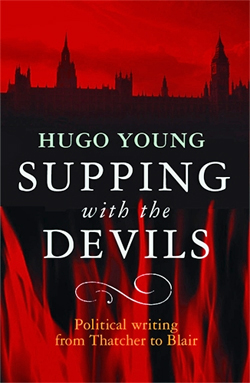
Supping with the Devils is the first collection of Hugo Young’s journalism. In it, he interprets the major events that have punctuated British political life, but it also considers subjects as diverse as the nature and future of the British state; the crisis of religious belief; and Britain’s place in the world. Urgent, penetrating and always original, these articles – taken from The Guardian, New Yorker and London Review of Books, among others – constitute a brilliant chronicle of a transformative period in British history.
Posted on October 19, 2003 by The Orwell Prize -

Neal Ascherson is one of Britain’s finest writers in an undefinable genre that fuses history, memoir, politics and meditations on places. His books on Poland and his collected essays on the strange Britain to which he returned from Europe in the mid 1980s were deeply influential. In 1995, Black Sea won critical praise in many languages and several literary prizes. Stone Voices is Ascherson’s return to his native Scotland. It is an exploration of Scottish identity, but this is no journalistic rumination on the future of that small nation. Ascherson instead weaves together a story of deep time – the time of geology and archaeology, of myth and legend – with the story of modern Scotland and its rebirth. Few writers in these islands have his ability to write so well about the natural context of history.
Posted on October 19, 2003 by The Orwell Prize -

For the last fifty years, the German Occupation of France has been regarded as a period characterised by four things: cold, hunger, the absence of freedom and above all fear; a time when the indigenous population was cruelly and consistently oppressed by the army of occupation. The people of France were either bold members of the Resistance or craven collaborators. In this riveting and provocative study, Robert Gildea reveals a rather different story, a story which shows that the truth lies – as so often – somewhere in between. The winner of the Wolfson History Prize 2002.
Posted on October 19, 2003 by The Orwell Prize -

A frank autobiography by Times columnist and ex-politician Matthew Parris. His childhood was spent on a variety of different countries as his engineer father moved jobs; Rhodesia, Cyprus, the Middle East and Jamaica. After Cambridge and Yale, he joined the Conservative central office at roughly the same time (aged 26) he discovered he was gay. He worked for Michael Dobbs, Chris Patten, and Mrs Thatcher (who famously fired him), before entering parliament himself. Part participant, part bystander, Matthew Parris describes what it was like to be so close to the centre and remain an outsider.
Posted on October 19, 2003 by The Orwell Prize -
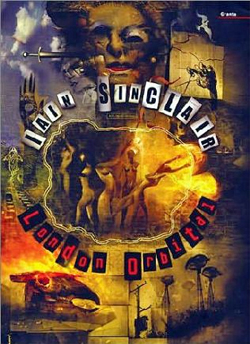
Encircling London like a noose, the M25 is a road to nowhere, but when Iain Sinclair sets out to walk this asphalt loop- keeping within the ‘acoustic footprints’- he is determined to find out where the journey will lead him. Stumbling upon converted asylums, industrial and retail parks, ring-fenced government institutions and lost villages, Sinclair discovers a Britain of the fringes, a landscape consumed by developers. London Orbital charts this extraordinary trek and round trip of the soul, revealing the country as you’ve never seen it before.
Posted on October 19, 2003 by The Orwell Prize -
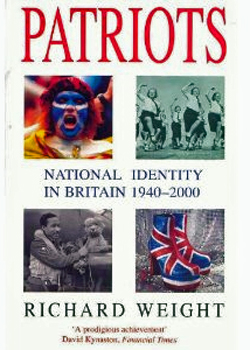
A brilliant cultural, political and social history of British national identity from our ‘finest hour’ in the dark days of 1940 to the Millennium celebrations of Blair’s Britain. Who are the British today? For nearly three hundred years British national identity was a unifying force in times of glory and despair. It has now virtually disappeared. In Patriots, Richard Weight explores the decline of Britishness and the rise of powerful new identities in England, Scotland, Wales and Ireland. Based on a wealth of original research, it is scholarly in depth and scope, yet never departs from a thoroughly readable and entertaining style.
Posted on October 19, 2003 by The Orwell Prize -

Francis Wheen has established himself as one of the most brilliant and admired journalists writing in Britain today with his massively acclaimed biography of Karl Marx, his contributions to radio and TV and his outstanding commentary and analysis.
This book brings together the best of his collected journalism from The Guardian, Observer and magazines such as Esquire and The Modern Review. Ranging from the follies of think-tanks to the future of swearing, the hypocrisy of New Labour to the madness of retired prime ministers, all via shady business deals and scabrous gossip, this is a book that none of Wheen’s legion of admirers will want to miss.
Posted on October 19, 2002 by The Orwell Prize -
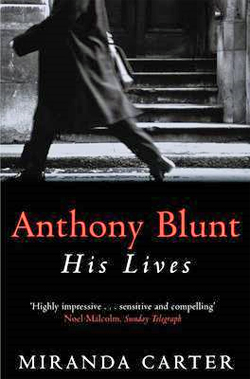
When Anthony Blunt died in 1983, he was a man about whom almost anything could be – and was – said. As Surveyor of the Queen’s Pictures and Director of the Courtauld Institute, Blunt’s position was assured until his exposure in 1979 left his reputation in tatters.
Miranda Carter’s brilliantly insightful biography gives us a vivid portrait of a human paradox. Blunt’s totally discrete lives, with their permanent contradictions, serve to remind us that there is no one key to any human being’s identity: we are all a series of conflicting selves.
- Miranda Carter and Sir David Omand, ‘How intelligent are our intelligence services?’ at the Sunday Times Oxford Literary Festival 2010
Posted on October 19, 2002 by The Orwell Prize -

In this bold, provocative and extremely funny book Roy Foster demolishes the clichés that surround Ireland’s past, examining how key moments from its history have been turned into myths – and, more recently, airbrushed and repackaged for Hollywood and popular culture. Whether discussing the ‘misery tourism’ of Famine theme parks, ideas of mystical Celticism, the contested ‘Irishness’ of Yeats or the sentimentalized childhoods of Angela’s Ashes and Gerry Adams’s memoir, The Irish Story brilliantly separates the tall tales from the truth.
Posted on October 19, 2001 by The Orwell Prize -

In ‘real’ wars, whole nations are mobilised, soldiers fight and die, victories are won. In virtual war, hostilities may not even be declared; the combatants are strike pilots and computer programmers, the watching nation is a television audience and instead of victory there is just an uncertain endgame. Kosovo was a virtual war: fought by pilots at 15,000 feet, commanded by generals whose only view of the battle was through their pilots’ bombing sights, reported by opposing media with competing versions of the damage; a war in which Americans and NATO forces did the fighting but only Kosovars and Serbs did the dying.
Michael Ignatieff has travelled these battle zones for a decade, sending back moving reports and penetrating analysis. Yet Kosovo in 1999 moved armed aggression into a new phase, and in Virtual War he examines this strange, remote type of warfare through the eyes of the key players – the roving diplomat Richard Holbrooke, General Wesley Clark and Louise Arbour, chief prosecutor of the war crimes tribunal – and of the people who suffered.

















